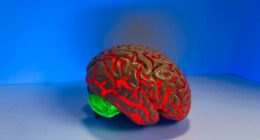Deep sleep (slow-wave sleep) is restorative, while REM sleep is associated with vivid dreams and essential for cognitive function and memory consolidation.
TL;DR Deep sleep Vs. REM sleep
Deep sleep, also known as slow-wave sleep, is characterized by a low level of brain activity and plays a crucial role in physical restoration and growth. On the other hand, REM sleep, which stands for rapid eye movement, is associated with vivid dreams and cognitive processing.
While both stages contribute to overall health and well-being, they serve different purposes during our nightly slumber. Deep sleep provides us with physical rejuvenation, allowing our bodies to repair tissues, build bone density, strengthen the immune system, and release growth hormones. It plays a vital role in memory consolidation as well.
What is deep sleep?

Deep sleep, also known as slow-wave sleep or NREM (non-rapid eye movement) sleep, is a critical stage of our slumber. It typically occurs in the first half of the night and is characterized by slower brain waves and minimal eye movement. During this phase, our bodies enter a profound state of relaxation, allowing for much-needed physical restoration.
What is REM sleep?

REM, which stands for Rapid Eye Movement, is a distinct stage of sleep that occurs multiple times throughout the night. During this stage, our brains become highly active while our bodies remain in a state of paralysis. It is during REM sleep that we experience vivid dreams.
Deep sleep Vs. REM sleep – Key differences
| Aspect | Deep Sleep (Slow-Wave Sleep) | REM Sleep (Rapid Eye Movement) |
|---|---|---|
| Brain Activity | Slow, synchronized waves | Active and similar to wakefulness |
| Muscle Activity | Minimal muscle activity | Muscle paralysis (except for eyes) |
| Dreaming | Rare, less vivid | Frequent, vivid, and memorable |
| Physiological Effects | Physical restoration | Cognitive function and memory consolidation |
| Duration | More prominent in the first half of the night | Becomes more frequent and longer in the latter half |
| Importance | Physical recovery and growth | Learning, emotional processing, and memory consolidation |
| REM Cycle Timing | Occurs multiple times throughout the night, with longer periods in the latter half | Becomes progressively longer with each sleep cycle, usually starting about 90 minutes after falling asleep |
The benefits of deep sleep
Deep sleep, also known as slow-wave sleep (SWS), is a critical stage of the sleep cycle with numerous benefits for physical and mental health. Here are some of the key benefits of deep sleep:
- Physical Restoration: Deep sleep is a time when the body undergoes significant physical repair and regeneration. It plays a vital role in healing and recovery, helping to repair muscles, tissues, and bones.
- Growth and Development: Deep sleep is especially important for children and adolescents, as it supports the release of growth hormones, contributing to physical growth and development.
- Immune System Support: Deep sleep helps bolster the immune system by promoting the production of cytokines, proteins that regulate the immune response and fight off infections.
- Memory Consolidation: Deep sleep plays a crucial role in memory consolidation, helping to transfer information from short-term to long-term memory. It aids in learning and cognitive function.
- Emotional Well-being: SWS is essential for emotional regulation and mental well-being. It can help process and regulate emotions, reducing the risk of mood disorders.
- Hormone Regulation: Deep sleep is associated with the regulation of various hormones, including those that control appetite and metabolism. Disrupted deep sleep can contribute to weight gain and metabolic issues.
- Detoxification: During deep sleep, the brain’s glymphatic system becomes more active, helping to remove waste products and toxins that accumulate throughout the day.
- Energy Restoration: Deep sleep replenishes energy reserves, leaving you feeling refreshed and alert upon waking.
- Stress Reduction: It can reduce the body’s stress response and lower levels of stress hormones, promoting relaxation and mental well-being.
- Improved Physical Performance: Athletes benefit from deep sleep as it aids in physical recovery and can enhance athletic performance.
The benefits of REM sleep
REM (Rapid Eye Movement) sleep is a crucial stage of the sleep cycle, and it offers several important benefits for overall health and well-being. Here are the key benefits of REM sleep:
- Vivid Dreaming: REM sleep is associated with the most vivid and memorable dreams. Dreaming during this stage can be entertaining and even provide insights into one’s thoughts and emotions.
- Memory Consolidation: REM sleep plays a vital role in consolidating and organizing information gathered throughout the day. It helps transfer short-term memories to long-term storage, contributing to improved learning and memory retention.
- Emotional Processing: REM sleep is essential for emotional regulation. It allows the brain to process and make sense of emotional experiences, which can lead to better emotional well-being and resilience to stress.
- Creativity: Many creative insights and problem-solving solutions are believed to emerge during REM sleep. It can foster creative thinking and innovation.
- Brain Restoration: REM sleep supports brain function by promoting the growth and repair of neural connections. This helps maintain cognitive abilities and mental agility.
- Stress Reduction: REM sleep can reduce the emotional intensity of stressors by allowing the brain to process and adapt to challenging or traumatic experiences.
- Motor Skills Development: It’s essential for the development and maintenance of motor skills, coordination, and fine motor control.
- Eye Health: REM sleep helps nourish and protect the eyes. Rapid eye movements during this stage may serve to stimulate and protect the eyes from potential harm.
- Temperature Regulation: During REM sleep, the body’s ability to regulate temperature is impaired. This may allow for temperature fluctuations, which can promote a cooling effect and help maintain overall body temperature homeostasis.
- Psychological Well-being: Adequate REM sleep is associated with improved mood, reduced symptoms of anxiety and depression, and an overall sense of mental well-being.
Image Credits
Featured Image By – Timur Weber
Image 1 By – Timur Weber
Image 2 By – Mariano Nocetti on Unsplash








